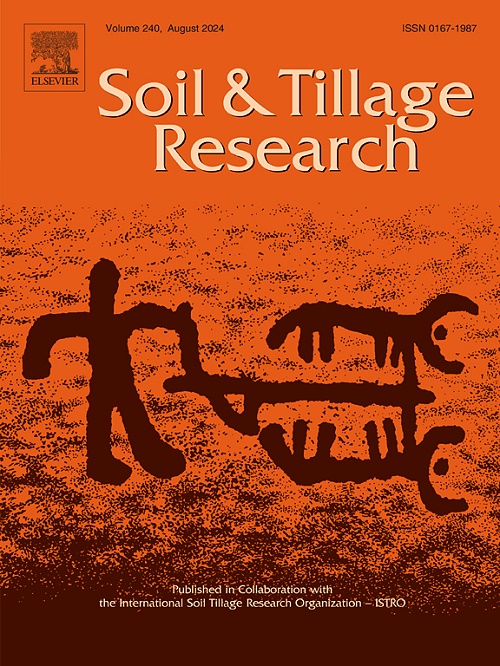Responses of crop yield and soil quality to organic material application in the black soil region of Northeast China
IF 6.8
1区 农林科学
Q1 SOIL SCIENCE
引用次数: 0
Abstract
The application of organic materials is an effective approach to mitigate the conflict between soil degradation and agricultural production. Therefore, it is important to optimize the organic material addition by assessing their influence on crop yield and soil quality (SQI) under various environmental and agronomic conditions. This meta-analysis, utilizing 1289 comparisons from 154 publications, evaluated the influence of organic material application on crop yield and SQI under various climates, soils, and agronomic practices (type, application rate, substitution rate of inorganic nitrogen fertilizer, tillage, and rotation) in Northeast China. Results demonstrate that organic material significantly increases crop yield by 14 % and improves SQI by 6 %. For climate, the regions with mean annual temperature < 2 ℃ and annual precipitation of 500–600 mm show optimal effects on crop yield and SQI. For soil conditions, organic material application increases yield by 3 %-10 % and SQI by 9 %–19 % in soils with SOM< 40 g·kg−1. In areas with severe soil erosion, organic amendments lead to greater improvement in soil quality by enhancing soil structure, increasing water retention, and promoting plant growth. Agronomic practices, such as crop rotation and longer experimental durations (3–6 years), result in the most significant improvement, while deep plowing has no significant effect. Replacing chemical fertilizers with organic materials improves SQI by 1 %-38 %, but substitution rates above 60 % decline crop yield. An Extreme Gradient Boosting model reveals that the experimental duration and organic material type are primary factors affecting the changes in crop yield and soil quality. Extending the experimental duration can mitigate the negative impacts of high pH or use of single organic fertilizer on crop yield and significantly enhance soil quality in regions with high soil erosion rates. These findings provide valuable insights for optimizing organic amendment strategies to balance yield and soil quality, promoting sustainable agricultural practices.
东北黑土区作物产量和土壤质量对有机质施用的响应
有机材料的应用是缓解土壤退化与农业生产矛盾的有效途径。因此,评估不同环境农艺条件下有机质对作物产量和土壤质量(SQI)的影响,优化有机质添加具有重要意义。本荟萃分析利用154份出版物中的1289个比较,评估了东北地区不同气候、土壤和农艺措施(无机氮肥类型、施用量、替代率、耕作方式和轮作)下有机材料施用对作物产量和SQI的影响。结果表明,施用有机肥可显著提高作物产量14 %,提高SQI 6 %。气候方面,年平均气温<; 2 ℃、年降水量500 ~ 600 mm对作物产量和SQI的影响最优。在土壤条件下,在SOM<; 40 g·kg−1的土壤中,施用有机物质可使产量提高3 %-10 %,SQI提高9 % -19 %。在水土流失严重的地区,有机改良剂通过改善土壤结构、增加保水、促进植物生长等方式,对土壤质量的改善作用更大。农艺措施,如轮作和较长的试验年限(3-6年),改善效果最显著,而深耕没有显著效果。有机肥替代化肥可使SQI提高1 % ~ 38 %,但超过60% %的替代率会使作物产量下降。极端梯度增强模型表明,试验时间和有机质类型是影响作物产量和土壤质量变化的主要因素。在土壤侵蚀率高的地区,延长试验时间可以减轻高pH或单一有机肥对作物产量的负面影响,显著提高土壤质量。这些发现为优化有机改良策略以平衡产量和土壤质量,促进可持续农业实践提供了有价值的见解。
本文章由计算机程序翻译,如有差异,请以英文原文为准。
求助全文
约1分钟内获得全文
求助全文
来源期刊

Soil & Tillage Research
农林科学-土壤科学
CiteScore
13.00
自引率
6.20%
发文量
266
审稿时长
5 months
期刊介绍:
Soil & Tillage Research examines the physical, chemical and biological changes in the soil caused by tillage and field traffic. Manuscripts will be considered on aspects of soil science, physics, technology, mechanization and applied engineering for a sustainable balance among productivity, environmental quality and profitability. The following are examples of suitable topics within the scope of the journal of Soil and Tillage Research:
The agricultural and biosystems engineering associated with tillage (including no-tillage, reduced-tillage and direct drilling), irrigation and drainage, crops and crop rotations, fertilization, rehabilitation of mine spoils and processes used to modify soils. Soil change effects on establishment and yield of crops, growth of plants and roots, structure and erosion of soil, cycling of carbon and nutrients, greenhouse gas emissions, leaching, runoff and other processes that affect environmental quality. Characterization or modeling of tillage and field traffic responses, soil, climate, or topographic effects, soil deformation processes, tillage tools, traction devices, energy requirements, economics, surface and subsurface water quality effects, tillage effects on weed, pest and disease control, and their interactions.
 求助内容:
求助内容: 应助结果提醒方式:
应助结果提醒方式:


